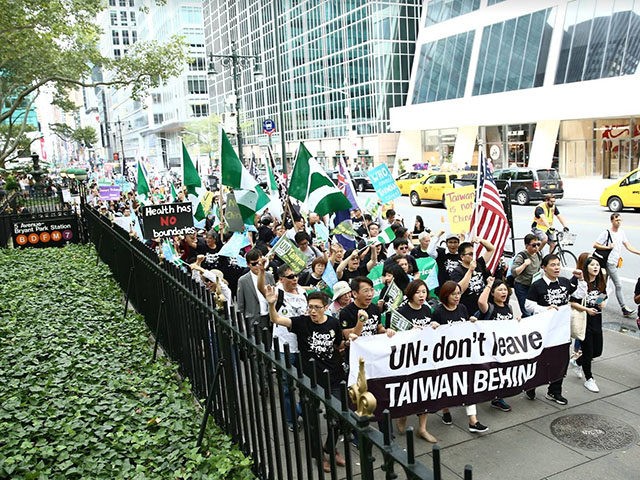About 500 people from the Taiwanese community in New York marched through Manhattan on Saturday for the annual “Keep Taiwan Free” event, urging the United Nations to extend full membership to the island. The U.N. General Assembly is scheduled to convene on September 17.
Organizers decided to draw attention by comparing Taiwan’s situation to the spectacular situation in Hong Kong, as reported by CNA:
Legislator Yeh Yi-jin, a member of Taiwan’s ruling Democratic Progressive Party (DPP) who participated in the march, said that drawing a lesson from Hong Kong, it is clear that Taiwan’s freedom and democracy have not just fallen from the sky but are the result of achievements attained by the blood and sweat of many Taiwanese over the years.
Taiwan needs to continue to strive to protect its democracy, freedom and human rights, she said.
As Hong Kong’s anti-government protesters have sustained their momentum for three months, the event organizers also invited Hong Kong protesters to speak by the side of a makeshift Lennon Wall, at Astor Place, to show their support for Hong Kong people’s aspirations for democracy and freedom.
Such a structure was adopted in Hong Kong as a symbol of freedom and opposition to communism.
These sentiments are not new, as Taiwanese have long viewed the deterioration of Hong Kong’s autonomy as a warning about what would happen if Taiwan embraced a similar “one country, two systems” relationship with Communist China. Many of the New York City marchers made this point explicitly, along with criticizing Beijing for its oppression of Tibet and the Muslim population of Xinjiang province.
The Taiwanese marchers showed their support for the Hong Kong protest movement by carrying signs with their five key demands — one of which, permanent withdrawal of a bill that would have made extradition to China easier, was finally granted last week — and repeating popular Hong Kong protest slogans. A replica of the Post-it covered “Lennon Walls” in Hong Kong was created.
A number of people with family ties to Hong Kong and groups supporting the Hong Kong protest movement participated in the Taiwanese march. The Taiwanese government sent a delegation including former Defense Minister Michael Tsai. There were no reported counter-demonstrators by supporters of the Chinese Communist Party, as has been the case with some pro-Hong Kong events held in the West and Australia.
“It doesn’t matter where you’re from, whether you cared about each other before. Now we have a strong single enemy that we are all fighting against,” said marcher Tony Sze, who was born in Hong Kong.
Beijing is adamantly opposed to Taiwan obtaining membership status in the United Nations and has the Security Council veto power needed to keep it out. The Chinese government has systematically blocked Taiwan from joining any group that would confer nation-state standing upon it, including humanitarian and health organizations.
Writing at Japan Times on Friday, Taiwanese Foreign Minister Jaushieh Joseph Wu argued the U.N. has been willfully misinterpreting its own resolutions, and losing sight of its core goals, by refusing to grant Taiwan representation:
Considering Taiwan’s robust experience and contributions, it is absurd that Taiwan is barred from sharing experience and critical information that could be used to better coordinate international efforts.
The oft-cited legal basis for excluding Taiwan from the U.N. is Resolution 2758 (XXVI), adopted by the U.N. General Assembly in 1971. However, the resolution does not address the issue of Taiwan’s representation in the U.N., nor does it state that Taiwan is part of the People’s Republic of China. In fact, Taiwan is not, nor has it ever been, part of the PRC. Only Taiwan’s democratically elected government can represent its 23 million people. Unfortunately, the U.N. continues to misuse and misinterpret the resolution to justify its wrongful exclusion and isolation of Taiwan.
International organizations are created to meet the common objectives of its members, not to serve the interests of just one member. Article 100 of the U.N. Charter clearly states: “In the performance of their duties the Secretary-General and the staff shall not seek or receive instructions from any government or from any other authority external to the Organization.”
Regrettably, the U.N. sits idly by whenever China seeks to impose its “One China” principle on the U.N. system. The most recent example involves dozens of NGOs being denied Consultative Status by the U.N. Economic and Social Council simply because a reference to Taiwan in their documents contradicts China’s demands.
“If the U.N. continues to yield to China’s coercion, rejecting Taiwan’s participation, it will only encourage Beijing’s callousness,” warned Wu.
The Epoch Times noted on Saturday that not only is Taiwan denied membership in the United Nations, but under political pressure from Beijing, it is denied non-member observer status for U.N. activities. Taiwanese passport holders are barred from U.N. premises and Taiwanese reporters are denied media accreditation, practices Taiwan and its supporters argue are contradictory to the U.N. Universal Declaration of Human Rights.

COMMENTS
Please let us know if you're having issues with commenting.